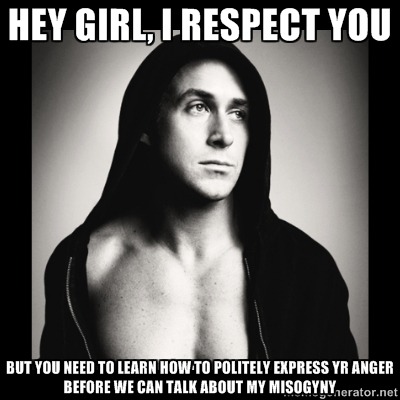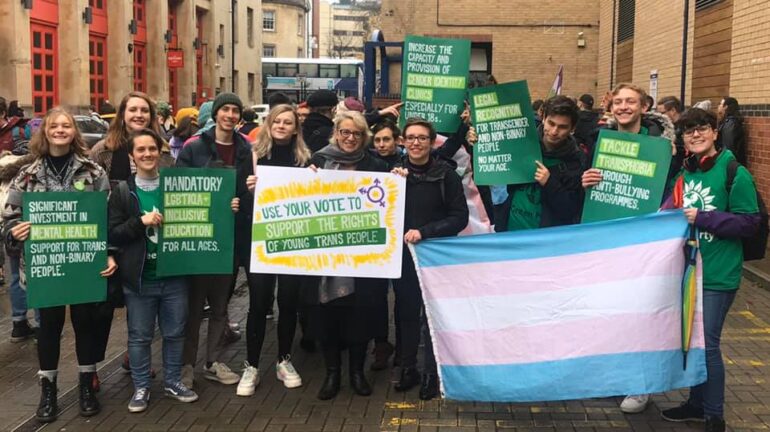Mean Girls: feminism, the internet, and being "nice"
This week I got into an argument in the comments of a blog post about rape allegations on another website. The location of this argument doesn’t matter, and although most of the content doesn’t bear repeating, it provided an almost textbook example of the prehistoric attitudes that women – and in particular, feminist women – face in online discussions. Rather than engaging with the evidence and reasoned arguments that women were putting forward, some of the male commenters were less interested in what we were saying than how we were saying it.
The problem? Apparently we women weren’t being nice enough. When we said that it was offensive to automatically assume that all rape allegations are false, we were told that we were being too emotional; if we responded with statistics about how common rape is, and how rare it is for anyone to be convicted, we were criticised for being too “academic”. Our points just couldn’t be taken seriously if we said anything was interpreted as sarcastic, angry, condescending, or lecturing. Nothing we did could convince them that we deserved to be listened to as equals.
As far as some of corners of the internet are concerned, women should only be allowed to join in with a discussion if they do it nicely. Goodness knows where they got that idea from, because most of the men who perpetuate this idea don’t hold themselves to the same standard. They can be as rude, aggressive, or dismissive as they like, and still think that they should be listened to. Of course, it isn’t sexist when they address a woman like that, because that’s how they speak to everyone, but if a woman uses the same tactics, that makes her a symbol of everything that’s wrong with feminism. If only feminists could be more agreeable, they say, then they would have already won.
Except that we wouldn’t win by being nice, because disagreeing with them at all is what puts us outside the boundaries of niceness. The only way to be acceptably nice is not to get involved in the debate – essentially, to concede the argument before it has even begun.
This is all bound up with gendered expectations of behaviour. Women are socialised to put up and shut up to a much greater degree than men, so when people tell women off for not being nice, what they often mean is that we’re not being feminine. An intrinsic part of femininity is behaving in ways that are pleasing to men, and this becomes so normalised that some men think that they’re entitled to demand certain types of behaviour from women. Think of those guys who pass women in the street and tell them to smile – it’s a similar thing; we’re not here to be awkward, we’re supposed to make the world more pleasant with our presence.
Perhaps the worst thing about this is that most of them aren’t being deliberately misogynistic when they tell feminists that we need to be more careful about how we express our views. They actually think that they’re the good guys, because they’re letting us into some secret knowledge about how to make feminism appeal to men. But they’re asking for it to be sanitised and separated from the strong emotions that many women feel when confronted with sexism (particularly when it’s in the form of sexual assault), so that they don’t have to deal with anything that might make them feel uncomfortable.
If telling the unvarnished truth means that I’m not being nice – then fuck nice. When people make excuses for violence against women, there are plenty of women who are going to get angry about it. Why? Because it’s difficult to remain calm and objective while discussing an issue that has such a major impact on our lives. When one in four women in this country will experience sexual violence first hand, haven’t we got good reason to be angry?




how is reasoned debate supposed to occur when this is basically the feminist bully pulpit:
Telling an angry woman to be “nice” is a deliberate provocation. It’s INTENDED to frustrate you. It’s INTENDED to make you feel powerless. It’s INTENDED to do exactly what it does: to make you think you’re not important, that your feelings don’t matter, and that you’re two feet tall. Dismissing a woman is a passive-aggressive tactic men use to stay in control of the conversation and, judging from and anger and frustration I see on this board, it’s a very effective tactic. If you’re a woman, understand this: the vast majority of men don’t want you as an equal, they want you as a subordinate. They want you dressed up, coiffed, perfumed, made-up, compliant and “nice”. These men don’t feel ashamed if you scold them and they aren’t going to play fair if you ask nicely. Men as a group are not going to cede power to women except through the use of force: force of argument, force of law, force of politics and, in the case of date rapists and spouse-abusers— force of violent self-defense. That’s as good as it gets. When a guy tells you to be “nice”, consider it a full frontal attack on your rights to be fully human, because that’s exactly what it is.
Men have always been allowed to be Bastards (and other men will admire them for it) but there is no offense greater than being a Bitch.
Brilliant post. I think women should call men out much more on their lack of reasoning, their bad tone and privalege. Definitely scrutinise where he is going wrong in his online behaviour and poijt it out more often.
Also I hate when people confuse ‘femininity’ with ‘women’. Women are not feminine, they’re people.
I’m far more likely to engage with and respect men who don’t feel the need to label me – that includes the label ‘feminist’.Because most often they appropriate it, like any label, in a negative way. The more he uses that, the less respect I have for a man’s opinion.
“And I see a great deal of women exploiting their feminine appeal onto the unsuspecting male, we’ve become experts at it and just because we use the gifts we’ve been given does not make us any less of a feminist.”
Yeah, actually, that’s a really unfeminist statement to make. “The unsuspecting male”… what bullshit.
Thanks, DBL, for lecturing us silly gurlz about how we should behave on the internet.
It might be a bit late in the day, but I just wanted to respond to some of the comments.
DBL – I’m not suggesting that we should all go around being rude, but that women are perceived as behaving aggressively in a discussion even when they aren’t. The bar for “appropriate” behaviour is often set much higher for women than for men.
Emery – I’m sorry that you felt ignored, but consider my privilege checked, and I’ll try to do better in the future. I was thinking about how femininity is perceived by others, rather than the intention behind it, however, I could have expressed this more clearly.
Lallie – Normally I wouldn’t get into this kind of debate either, but in this instance, a writer on a well-known, progressive Scottish blog had posted something that perpetuated rape myths – in apparent sincerity – and I wasn’t comfortable letting it pass without comment. I’m not sure quite what you’re disagreeing with about my views on femininity, though. I don’t claim that it is inherently a bad thing; what I object to is the idea that all aspects of feminine behaviour should be compulsory for all women, all the time. We’re all individuals, and should be allowed to express ourselves differently without suffering social punishments.
Really good and well reasoned blog post. Reminds me a bit about the ol’ breastfeeding argument – it’s fine, as long as you do it discreetly. It’s ok for us to be women, but can we just do it in the least noticeable way?
And to be honest I wouldn’t even get into a discussion about sexual assault on the internet, with the amount of internet trolls going about, mostly male, trying to provoke a response from the female population. And they’ve succeeded in getting their response. I wouldn’t talk to these people in every day life so why would I talk to them on the internet? They aren’t even worth my time. It comes down to the point where these people that are saying these nasty disgusting things to provoke educated women into a response will be on the dole and we are in high powered, highly paid jobs. That is feminism for you.
I disagree with your femininity statement. And I see a great deal of women exploiting their feminine appeal onto the unsuspecting male, we’ve become experts at it and just because we use the gifts we’ve been given does not make us any less of a feminist.
It’s just another tactic. Addressing something other than the issue at hand, that involves *your* behavior, is deflection. It puts you on the defensive. The problem is, many people aren’t about problem-solving — specially when it comes to having to accept fault. They’re about winning the argument. At your expense.
You know, I don’t owe anyone ‘nice’. I am under no obligation to make anyone’s interaction with me soft, nonthreatening, or more comfortable at the expense of my honesty.
However, I do try very hard to practice ‘civil’. This means using reasoned arguments instead of angry diatribes. It means attacking people’s arguments based on logical inconsistencies instead of attacking them personally. It means telling someone he’s wrong, not telling him he’s stupid. It means working hard not to rise to misogynistic bait chummed into my waters.
When someone is rude to me, I stop listening to him; I say, “Do please forgive me the interruption of your recitation, but I find that your lack of courtesy disinclines me to continue this discussion. I regret that I must refuse to further engage you on the topic. (yes, this occasionally means blocking or banning problem people)” By the same token, if I want to be listened to, I practice the basic rules of civil discourse. This does not mean I am not passionate or emotional, it just means that instead of cheap shots and profanity, I deliver an ice-cold controlled evisceration of the argument, with unfailing courtesy and a teeth-baring smile.
I am angry about how women are treated. I am angry about how *I* have been treated specifically, but also on behalf of other women. I am very angry, and no one who’s crossed wits with me will accuse me of being ‘nice’, but the practice of civility makes it much harder for them to dismiss me as ‘shrill’ or ’emotional’ or ‘irrational’ out of hand. They are more likely to actually have to focus on the things I say, to which it becomes abruptly clear they have no response.
And when someone does tell me, “You should be nicer if you want to be taken seriously,” my only response is, “You, sir, have not earned ‘nice’. You should be grateful for the unearned civility I bestow upon you; if you want ‘nice’ you must be far more respectful and courteous to merit it.”
This seems to be a common problem in general in the blogosphere. People don’t read what you actually say, but they often read into things because of what they think it’s going to say – based on their own conceptions of course.
Maybe men in specific are more guilty of this. An unrelated story, but still: My friend (woman) bought an apartment and the fireplace was not functioning. So she demanded some of the money she paid back and the guy replied: “I thought you were a nice girl!” Nice? He made a big mistake not telling her that it didn’t work! (She got the money by the way.)
‘An intrinsic part of femininity is behaving in ways that are pleasing to men’ – i def understand what you mean here – unfortunate wording tho; one shouldn’t confuse the feminine ‘norms’ with femininity itself. as a femme lesbian it gets pretty tiresome being invisibilised & having to have to explain to people that femininity is my identity – dressing femininely is a form of personal expression and self-care.
great post though, thanks for the read x
Excellent. Yes to all this. Thank you for writing.
Nobody should really have an expectation of getting a response from somebody to whom they are not being polite, male or female. They certainly shouldn’t expect any meeting of minds. I feel equally unwilling to engage with impolite/angry males and females, because life is short and it’s not worth it. Maybe they are perfectly justified for being angry but that doesn’t mean I need to listen to them. And the second somebody accuses me of being a certain thing or thinking a certain way because of my gender, I am no longer really interested in talking to them. In other words, I am basically just like you, only in reverse.
Very good piece. Gender certainly plays a role in the tone argument, though it’s also applied to anyone critiquing any privileged group. Malvina Reynolds had this to say about it during the Civil Rights struggle in the U.S.
Beautifully written – and unfortunately all too true.
Excellent post!
“Nothing we did could convince them that we deserved to be listened to as equals”… this reminds me of a Radio 4 feature which ran when the Playboy club reopened in London. They had Kat Banyard on, who spoke excellently about links between what is often portrayed as ‘harmless fun’ and sexual discrimination and violence. To argue for the other side they got Michael Winner on, who refused to engage with her arguments and dismissed her as ‘this crazy woman’, effectively shutting down the debate. Made me seethe!
Spot on!
Also you wrote a double “could” in the last sentence of the 2nd paragraph – had my OCD sense tingle a little.